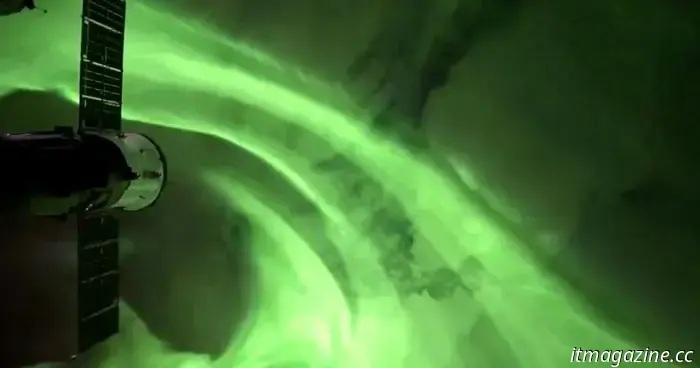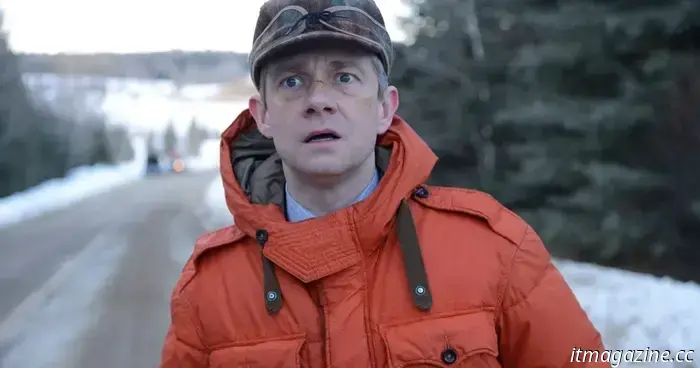
The most recent aurora observed from space is truly breathtaking.
Ask any astronaut about the joys of spending time on the International Space Station (ISS), and you’ll likely hear them talk about the breathtaking views they get to see from 250 miles above the Earth.
The sights can range from stunning landscapes below, sunrises and sunsets every 90 minutes, incredible views of thunderstorms, to mesmerizing sights beyond Earth such as the moon and the Milky Way.
They also regularly witness auroras, an impressive natural light display resulting from the interaction of solar winds with Earth's magnetic field. NASA astronaut Don Pettit, who is an ISS crew member and always seems to have a camera ready, has recently shared a couple of video clips showcasing recent auroras as the station passed overhead.
These clips are not the first auroras captured from the space station, but the first video appears distinct from other aurora clips we've seen in recent years, featuring lush green hues, which Pettit describes as "vaporous turbulence," sweeping dramatically across the frame.
The second video offers a wider view that also captures the curvature of the Earth, with the footage being equally dramatic.
Pettit has been in orbit since September of last year, continuously delighting people on Earth with a steady stream of images and videos taken from high above.
One of his most striking images depicts rivers in the Amazon Basin at night, with Pettit noting that the photograph reminded him of “flowing silver snakes.” He also shared an impressive picture of Blue Origin’s inaugural launch of the New Glenn rocket, showing the rocket's second stage as it streaked through the frame, accompanied by multiple star trails.
Pettit’s remarkable photography continues the tradition of other astronauts with a keen artistic eye, like French astronaut Thomas Pesquet, who focused on capturing beautiful images of Earth from above.
Not too long ago, Trevor transitioned from one tea-drinking island nation that drives on the left (Britain) to another (Japan)…
A stunning image taken by a recent arrival at the ISS shows the dazzling night lights of London shining 250 miles below. NASA astronaut Don Pettit—NASA’s oldest active astronaut at 69—arrived at the station last week for his fourth trip to space.
In the final weeks of his six-month stay aboard the ISS, NASA astronaut Matthew Dominick shared a beautiful time-lapse video of Earth. The footage reveals a significant portion of Asia as the ISS flew over it at night from about 250 miles up. The video highlights numerous lightning flashes across a vast area, bright clusters of city lights, and colorful lights from fishing boats, which Dominick describes as “one of my favorite things to see at night from the ISS.” Additionally, it shows a mysterious bright red light, the origin of which Dominick is uncertain about.
A remarkable image captured by an astronaut on the ISS shows SpaceX’s Polaris Dawn Crew Dragon capsule entering Earth’s atmosphere at high speed during its return with four crew members early Sunday morning. Close inspection of the image reveals a streak of light and the Crew Dragon, along with some city lights in the background. The five-day Polaris Dawn mission involved four non-professional astronauts and marked the first-ever privately funded spacewalk, also taking humans farther from Earth than any point since the Apollo missions five decades ago.





Other articles
 Disregard the iPhone 17 Pro design; the iPhone for its 20th anniversary might be its most daring yet.
Mark Gurman has stated that the 20th anniversary iPhone Pro will feature a "daring" design.
Disregard the iPhone 17 Pro design; the iPhone for its 20th anniversary might be its most daring yet.
Mark Gurman has stated that the 20th anniversary iPhone Pro will feature a "daring" design.
 Future Samsung Galaxy Ultra models may forfeit an important feature.
Samsung may abandon the integrated S Pen in upcoming Galaxy Ultra models.
Future Samsung Galaxy Ultra models may forfeit an important feature.
Samsung may abandon the integrated S Pen in upcoming Galaxy Ultra models.
 Apple's anticipated smart home hub has encountered another delay.
The anticipated smart home hub from Apple is reportedly facing another delay.
Apple's anticipated smart home hub has encountered another delay.
The anticipated smart home hub from Apple is reportedly facing another delay.
 DeepSeek prepares for the next AI revolution with self-enhancing models.
The team at the prominent Chinese AI laboratory, DeepSeek, is developing a new line of AI models named DeepSeek-GRM that utilize an innovative self-enhancing method.
DeepSeek prepares for the next AI revolution with self-enhancing models.
The team at the prominent Chinese AI laboratory, DeepSeek, is developing a new line of AI models named DeepSeek-GRM that utilize an innovative self-enhancing method.
 The recent issue of melted cables has resurfaced concerns regarding the old design flaws of the Nvidia RTX 5090.
Reports of melting cables persist with the RTX 5090, indicating that the 12V-2x6 connector issue continues to be a problem for Nvidia's graphics cards.
The recent issue of melted cables has resurfaced concerns regarding the old design flaws of the Nvidia RTX 5090.
Reports of melting cables persist with the RTX 5090, indicating that the 12V-2x6 connector issue continues to be a problem for Nvidia's graphics cards.
 If there's only one Hulu show you should watch this April, make it this one.
Fargo has been available on Hulu for almost ten years, and the innovation in every season is a significant factor in why the series is enjoyable to watch.
If there's only one Hulu show you should watch this April, make it this one.
Fargo has been available on Hulu for almost ten years, and the innovation in every season is a significant factor in why the series is enjoyable to watch.
The most recent aurora observed from space is truly breathtaking.
We've observed numerous auroras from the space station, but this recent sighting is particularly remarkable.
